“Note taking apps – why do you even need them? Can’t you just write it down using a pen and paper?”
If this is you, the article is going to be an eye-opener.
First of all, you should know that taking notes isn’t just about writing down everything that you think or hear. Taking notes is about staying focused, being interactive, and recalling information that otherwise is lost.
Typically when we get an idea or we hear one, we tend to look for a piece of paper to jot it down. However, the times are changing. We now live in an era of information overload. And, sadly, it has made it quite easy for us to lose information on a daily basis. As a result, it becomes even easier to forget to check out the information or share it with your team. Or worse, lose the information that you jotted down. This is where apps for taking notes come in handy.
The good thing is that we have a dizzying array of tools and apps for creating, organizing, saving, and sharing notes—at home, at work, and even on the go.
In fact, creating and managing notes using note taking software is an amazing experience. The only complication here is “How do you choose which one to use?”
Create notes, collaborate on them, and work smarter. Do it all with one tool—ProofHub!
List of best apps for note taking:
Here’s the list of 10 best note taking apps and tools that will help you save your important ideas, thoughts, and information securely, in one place, with any time and anywhere access.
1. ProofHub
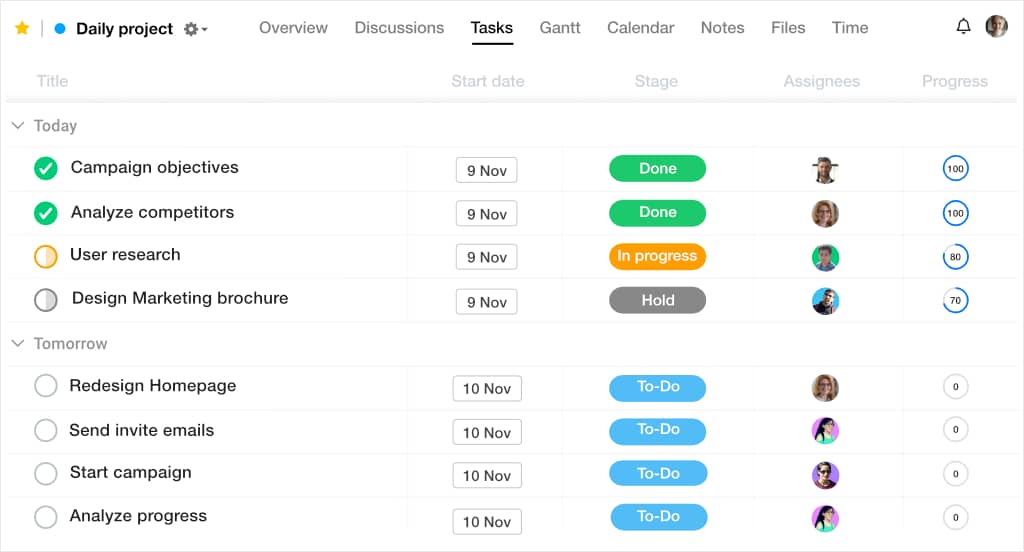
About ProofHub
ProofHub isn’t just one of those regular note taking apps or a simple file management system; it is more of an all-in-one project management and team collaboration software with note taking being one of its core capabilities.
The Notes feature in ProofHub is easy to use and perfect for jotting down almost every important piece of information related to a project. You can keep a record of your daily minutes of meetings and save all your ideas securely. One of the best things about ProofHub’s notes is that you can share them directly with someone else and even let them make contributions to those notes.
As a note taking app, ProofHub makes it easy for you to create notes for almost anything. You can assign a specific color to each note to make it easily identifiable. Additionally, you can add comments, attach files to a note, and store multiple notes together in a Notebook to keep things neatly organized.
Apart from note taking, you can also accomplish various aspects of project management and team collaboration using ProofHub. You can use custom workflows and boards, create multiple tasks with deadlines, assign them to your team members, define custom roles, and proof files online. Other key highlights of ProofHub include time tracking, custom project reports, instant messaging & group chat, and real-time notifications for everything happening within different projects.
ProofHub Pros
- Intuitive interface with little to no learning curve
- Delivers robust performance and comes with the ability to handle multiple projects and a virtually unlimited number of notes
- Pin notebooks to make them easily accessible
- Allows you to keep track of all the changes made to your notes
- Mark notes as private to safeguard all your important information from unwanted access
- Look for notes easily using advanced search and download notes in PDF format
- Straightforward pricing make it a favorable choice for teams of all sizes
ProofHub Cons
- A powerful but limited number of app integrations
ProofHub Pricing
- For information on our pricing plans, kindly visit our pricing page.
Create notes, collaborate on them, and work smarter. Do it all with one tool— ProofHub Try for FREE
2. Evernote
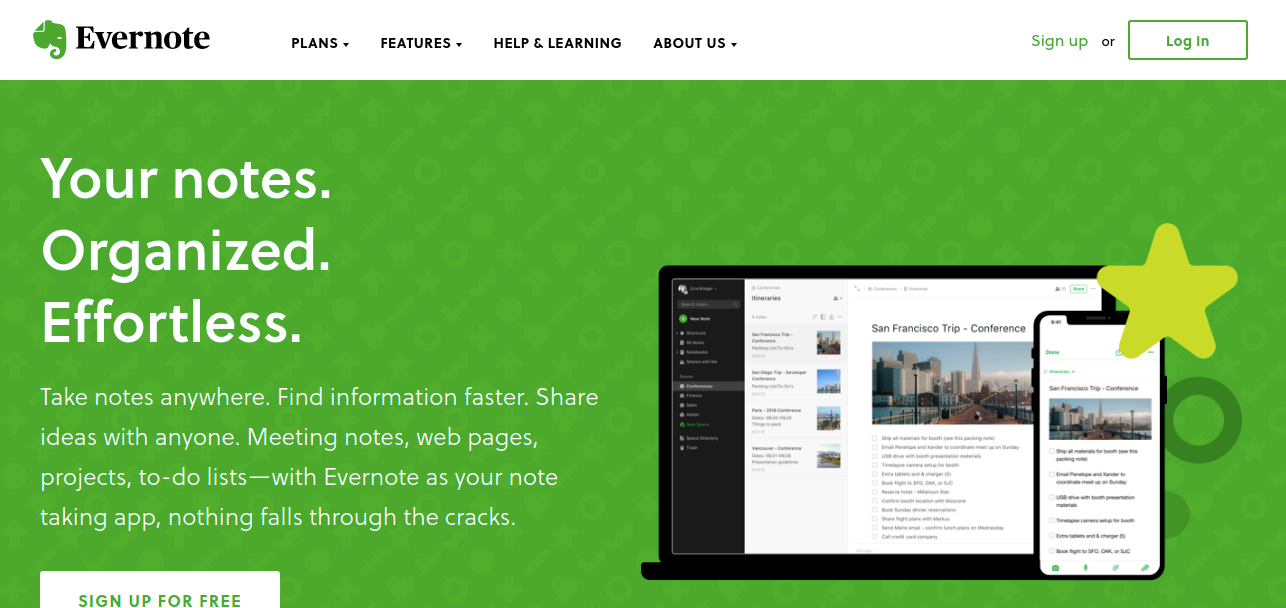
About Evernote
Using Evernote, you can store everything from personal thoughts and ideas to business projects, and know they’re always safe and secure, and easily accessible whenever you need them. Rated as one of the best apps for taking notes, Evernote auto-syncs across all your devices, and you can invite anyone to collaborate on whatever is on your mind. This versatile note taking app has a range of solutions that fits your needs.
Evernote Pros:
- PDF and DOC search lets you find the information you want
- Formatting tools help you write what you think
- Evernote connects with the productivity tools you already use, so you can work your way
Evernote Cons:
- No option to record audio and video directly from Evernote
- Images cannot be rotated or cropped in Evernote
Available For: Windows, iOS, Android
Further Reading: Evernote Alternatives: 12 Note-Taking Apps You Should Be Using Today
What is better ProofHub or Evernote?
ProofHub Vs Evernote
| ProofHub | Evernote |
| Overview:
ProofHub is an all-in-one software suite for growing teams and businesses. With ProofHub, a team gets all the tools it needs to plan, collaborate, assign, track, and deliver work faster, together. Best for:
and more… List of features: Discussions, To-do lists, and tasks, Workflows & Boards, Events & milestones, Gantt charts, Customization of the file upload window, Reports, Custom roles, Files, Proofing, Time tracking, Notes, Chat, Security options, Customization, Multiple languages, Advanced search, Custom domain SSL, API, and Mobile compatibility Integrations: Freshbooks, Google Calendar, iCal, Box, Dropbox, Google Drive, and OneDrive Supported devices: Windows, Linux, Android, iPhone/iPad, Mac, Web applications Available support: Email, Live support, Training, Tickets | Overview:
Evernote is an app designed for note-taking, organizing, task management, and archiving. Best for:
List of features: Web clipping support, Mobile and Web interface, Web clipper browser extensions, Edit rich text and sketches, Geolocation, Content available on any device, Snap photos, record audio, save documents, Save favorite webpages, Shapes, arrows and quick sketches, Sketch on a page and sync notes to any device, Share notes and collaborate on files, Annotation and markup, Feedback sharing Integrations: No information available Supported devices: Windows, Android, iPhone/iPad, Mac Available support: Email, Live support, Training |
Is ProofHub the best note taking alternatives to Evernote? Sign up for FREE and see for yourself.
3. Bit.ai
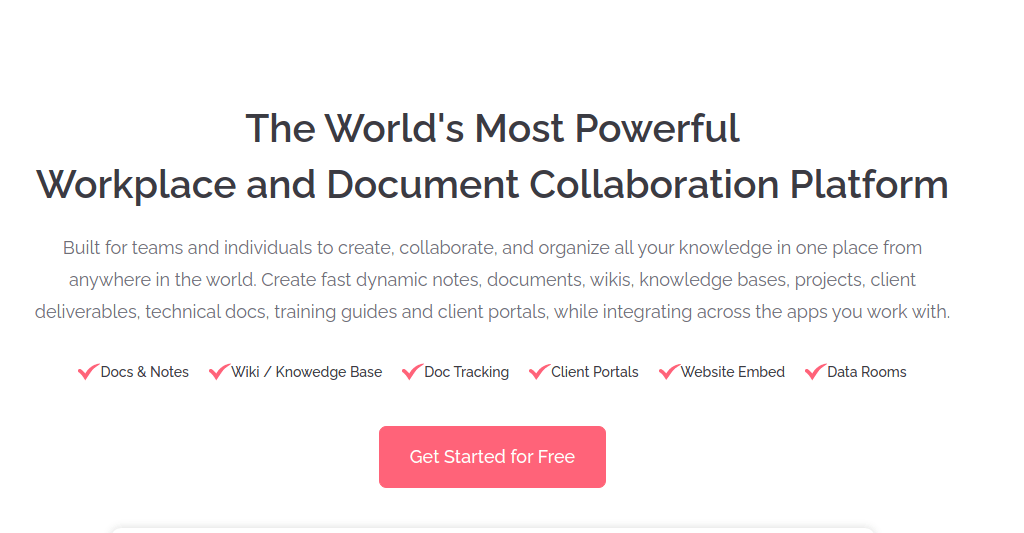
Bit is a new-age cloud-based document collaboration platform that is perfect for creating documents and note-taking. On Bit, you can create workspaces around projects, teams, and departments to keep your notes and documents organized. These workspaces are fluid so your notes, collaborative documents, and published work can move through your organization’s workflow. The best part? You can brainstorm and collaborate in real-time on the notes that you create via chat, in-line comments, @mentions, and more.
Moreover, with Bit’s clean and minimalistic editor, you can quickly format your notes by adding headers, footers, checklists, numbered lists, and more. You can even enrich your notes visually by embedding images, spreadsheets, videos, GIFs, and much more! All in all, Bit will definitely give you a one-of-a-kind documenting and note-taking experience.
Bit Pros:
- Over 100 rich media integrations
- Auto-formatting
- Real-time collaboration
- Smart workspaces
- Clean and minimalistic editor
Bit Cons:
- Bit is not available as a mobile app, however, Bit documents are fully responsive and look great on all devices.
Available For: Web
4. Nifty
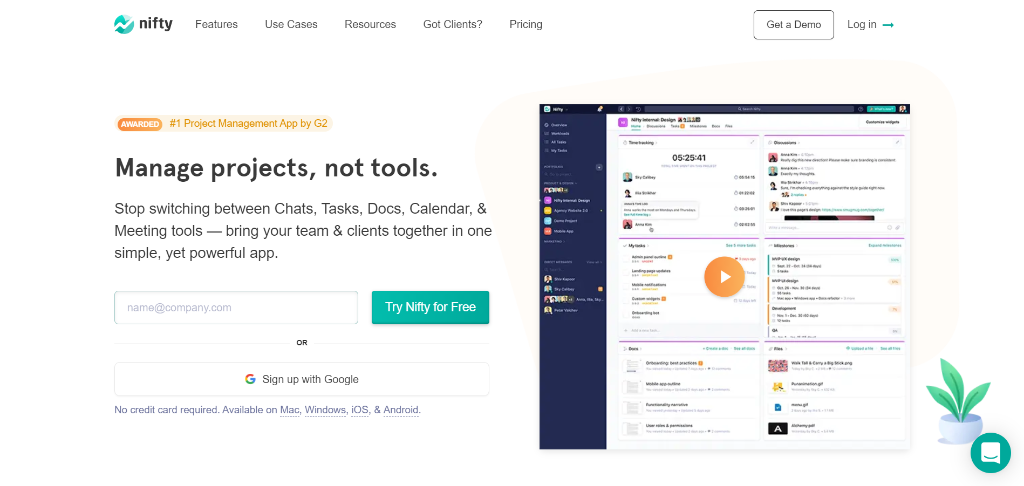
Nifty allows you to stop switching between chats, tasks, docs, calendar and meeting tools. You can now bring your team and clients together in one simple, yet powerful app. Setting goals and timelines is a breeze by automating progress as tasks are completed.
You can flexibly organise, prioritise and manage daily work with a high level of detail using Kanban, List, and Swimlane views. Empower members to share ideas, finalise specifications and gather feedback in real-time with chats and one-click Zoom meetings.
You can also create docs and notes for your projects and share with anyone. Nifty also integrates natively with Google Docs. You can balance workloads easily by accessing automated progress reporting across all your projects and team activities to ensure operational clarity.
Nifty Pros:
- Manage campaign tracking
- Consolidate campaign assets
- Google Docs integration
- One-click Zoom meetings
Nifty Cons:
- None so far
Available For: Windows, iOS, Android
5. ClickUp
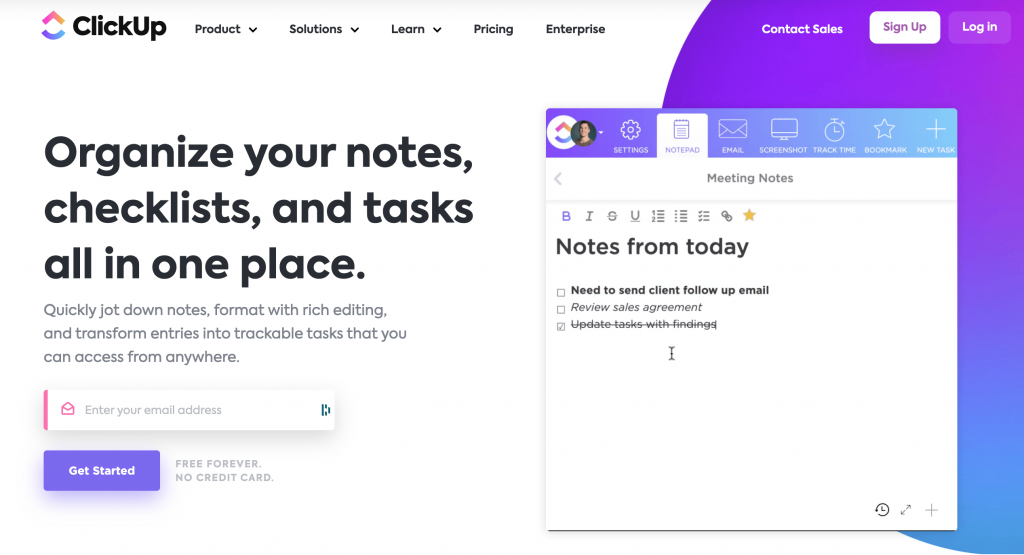
ClickUp is a project management platform built to increase your productivity. Its Notepad feature helps you turn any thought into an action item. Customize your notes using rich text editing, or track your to-do’s using a checklist, to keep your notes organized for when you need them later.
With one click, convert any note into a task and access ClickUp’s Whiteboards, Dashboards, Goals, custom workflows, time tracking, chats, and much more. If your notes ever become too long, there are ClickUp Docs. Docs are great for personal use or collaboration and are customizable to fit your needs.
The best part about ClickUp is that it centralizes all your different types of notes into a single place that is accessible on any device. Instead of jumping between apps to find a note, search for any note from any device without hassle.
ClickUp Pros:
- Direct access to the full-powered project management platform
- Native time-tracking and screen recording abilities
- Records version history for Docs, tasks, and notes
- Powerful search functionality
- Real-time sync across all users and all devices
ClickUp Cons:
- The browser-extension version of the notepad is only available on Google Chrome
Available For: Web, Desktop, Mobile, Chrome Extension
6. Slite
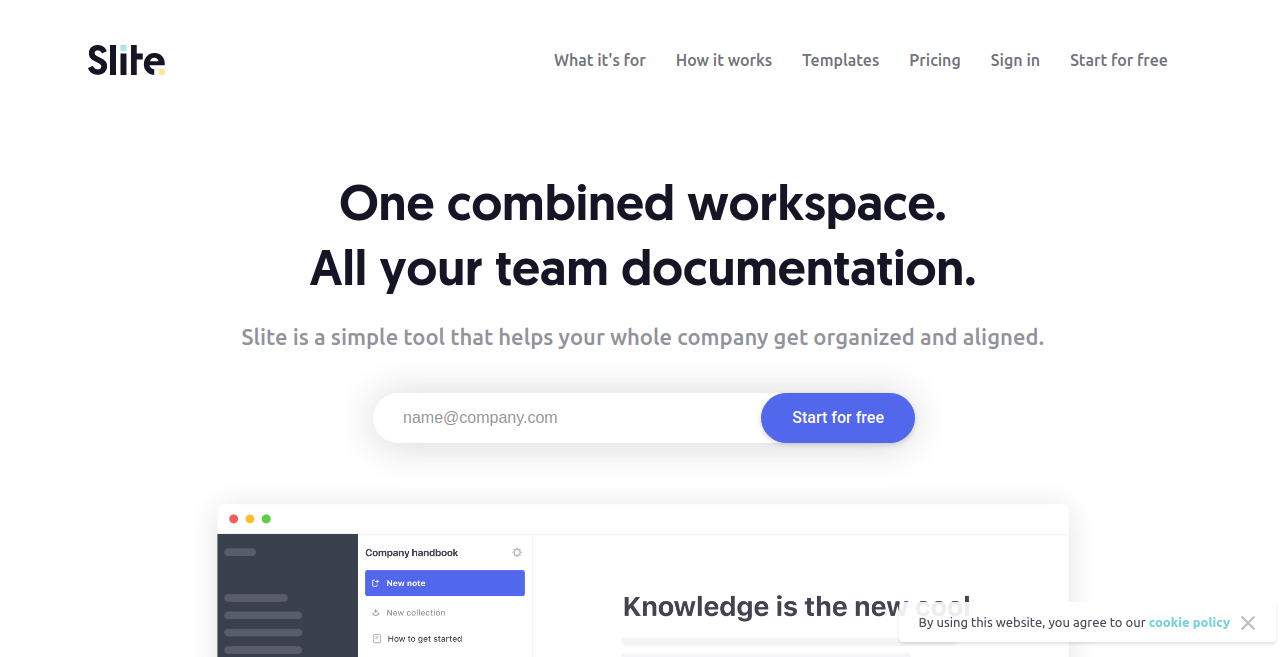
About Slite
With Slite, you can easily share and collaborate on information with your team. Track what tasks your team is working on, review, and give feedback to ensure your project is progressing in the right direction on the go with Slite’s versatile and user-friendly interface. Slite’s structure gives you a clear view of your docs so that you can easily organize and locate them.
Slite Pros:
- Slite seamlessly integrates with Asana, Trello, and Slack
- Advanced formatting features
- Excellent support team
Slite Cons:
- Doesn’t integrate easily with the other tools we use
- Basic interface
- Needs improvement in text editing
Available For: Windows, iOS, Android Beta
7. Notion
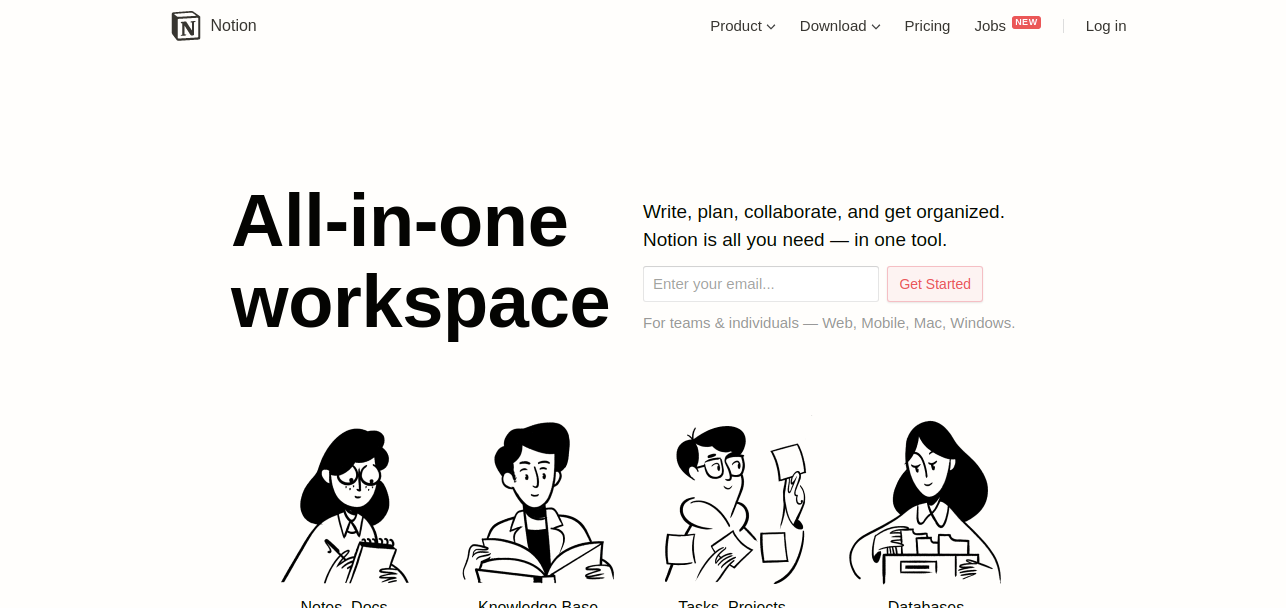
About Notion
It is especially easy to collaborate on notes with Notion. This particular tool enables you to write in a clean, uncluttered workspace, create your own personal wiki, plan your tasks using multiple views, and create spreadsheets & databases for recording everything. Notion offers an excellent set of features and real-time collaboration. It allows teams to share, post comments, assign tasks, and set reminders. This sleek and sophisticated note taking app blends everyday work apps into one.
Notion Pros:
- Highly customizable
- Incredibly flexible
- Intu
- itive organizational workflows
- Great user experience
Notion Cons:
- The usability of the mobile app isn’t good
- The lack of an API
- Can be confusing and disorganized at times
Available For: iOS, Windows, Mac, Android
Organize all ideas and information in one place with ProofHub. Sign up for free!
8. Zoho Notebook
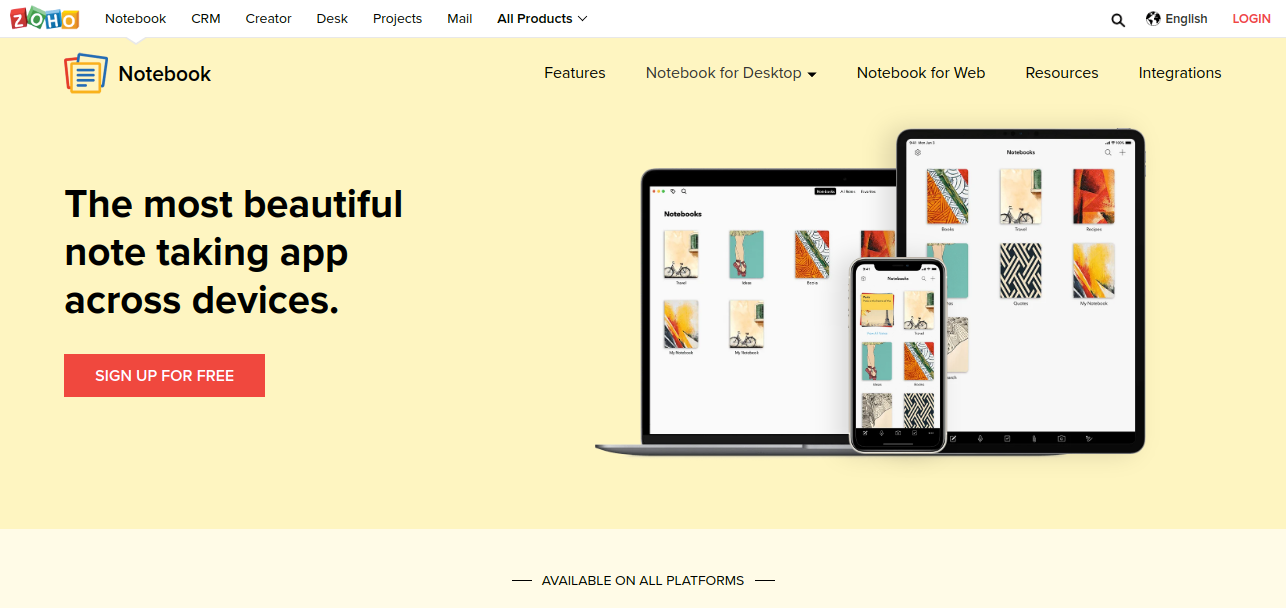
About Zoho Notebook
Zoho Notebook is a completely free note taking app that allows teams to create unlimited notes and notebooks in the cloud. In addition to note taking, Zoho Notebook is also a great app for real-time collaboration. It makes storing and sharing information easy, quick, and manageable.
Zoho Notebook Pros
- Allows recording audio notes
- Enables you to add images, checklists, or audio, all in the same note automatically
- Syncs notes with all devices and cloud
Zoho Notebook Cons
- No image editing option
- Limited amount of fonts
- Lacks the more advanced features
Zoho Notebook Pricing
- Zoho Notebook is free to use application
9. Dropbox Paper
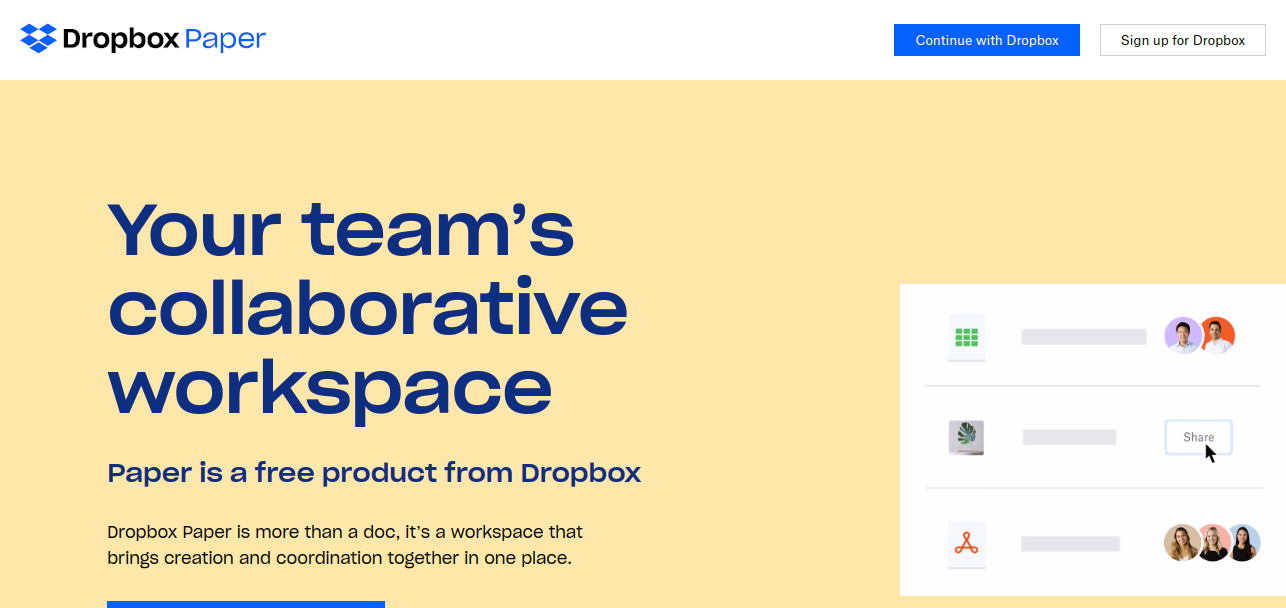
About Dropbox Paper
Dropbox Paper is an online document workspace where you can organize and display all your display text, media, and files in a single location. Users can easily collaborate with others and access your docs from anywhere. You can drag and drop images, PDFs, videos, audio files, spreadsheets, and over 175 other file types directly into your docs.
Dropbox Paper Pros:
- Gives you the freedom to design your documents precisely the way you want
- Super easy to learn, navigate, and use
- User-friendly interface
Dropbox Paper Cons:
- Lack of spell check feature
- The default view of folders is rather unappealing
Available For: Windows, iOS, Android
Also Read: 17 Best Alternatives To Dropbox You Need To About In 2023!
10. Simplenote
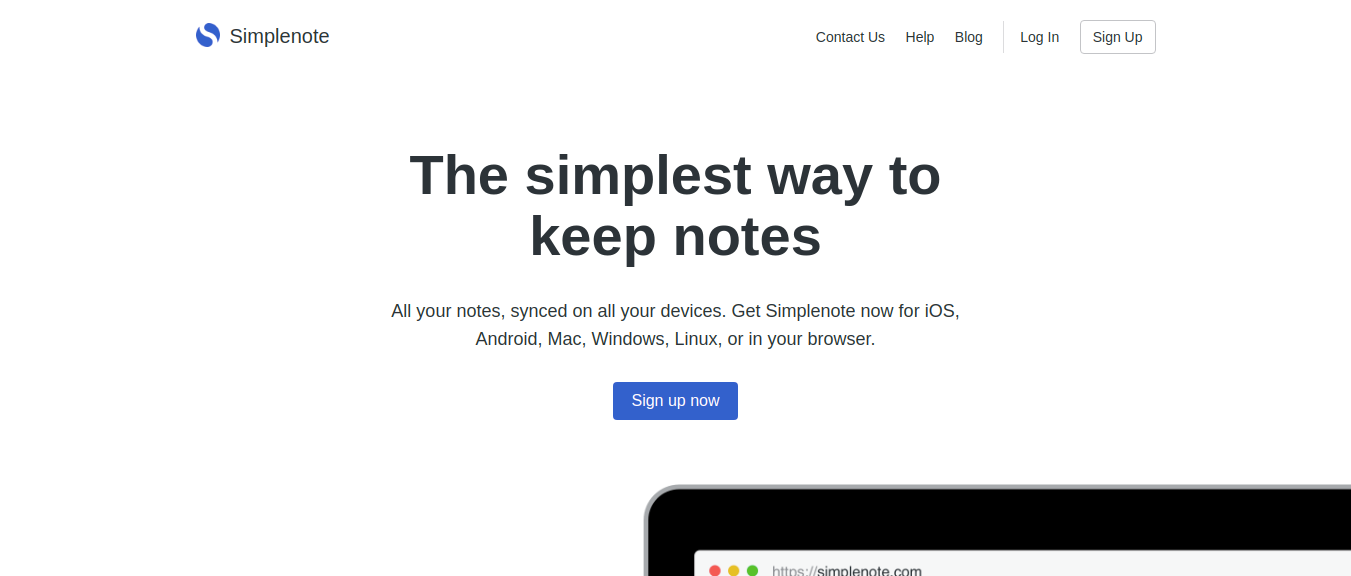
About Simplenote
You can categorize your notes using tags, which makes it easy to organize notes and find them later on. This cross-platform note taking tool offers users the easiest way to create notes and to-do lists, capture ideas, and more. It syncs across all your devices for free.
Simplenote Pros:
- Allows quick and easy formatting
- Notes quickly sync across mobile apps and the web app
- Easy to use and it does not require registering there for editing
Simplenote Cons:
- Does not have Windows apps
- No text formatting tools
- Limited to one tag
Available For: iOS, Mac, Android, Windows
Also read: Top 32 Online To-do List Apps To Stay Ahead
11. Standard Notes
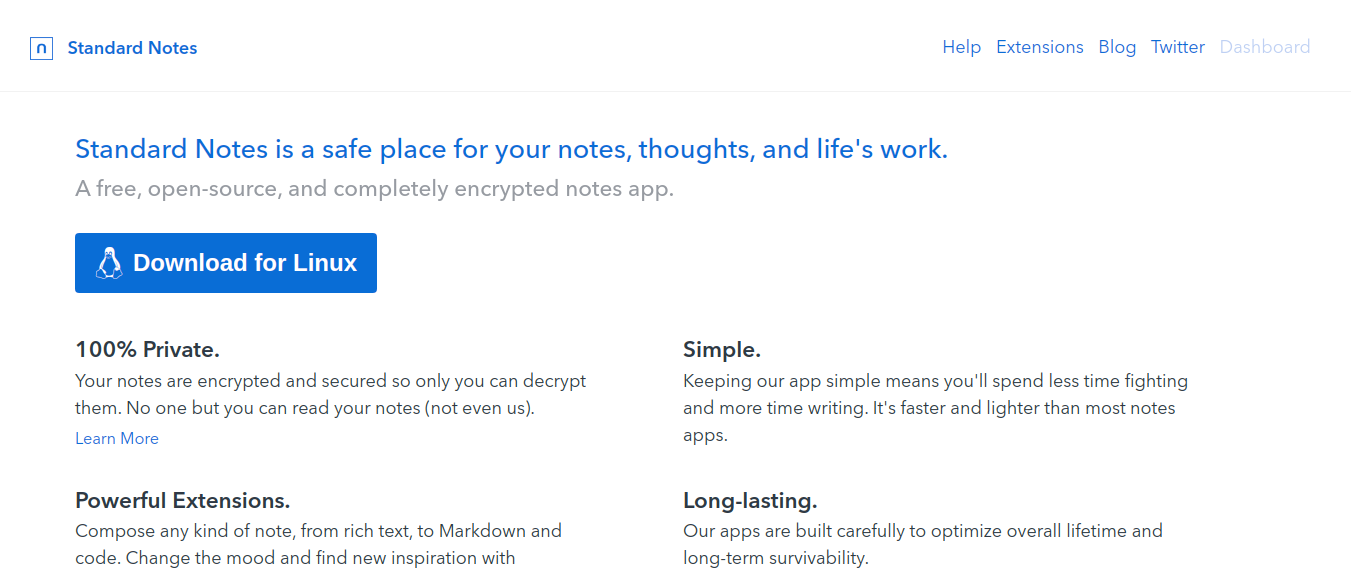
About Standard Notes
Standard Notes is a free, open-source, and completely encrypted note taking app that allows you to compose any kind of note, from rich text to Markdown and code. Standard Notes is faster and lighter than most note taking apps available today. In its free format, this app is an easy-to-use text editor that has impermeable privacy.
Standard Notes Pros:
- 100% secure and private
- Powerful extensions
- Simple, faster, and lighter
- Long-lasting
Standard Notes Cons:
- Steep monthly subscription price
- Mobile apps lack functionality
- No spell check
Available For: Windows, iOS, and Android
12. Apple Notes
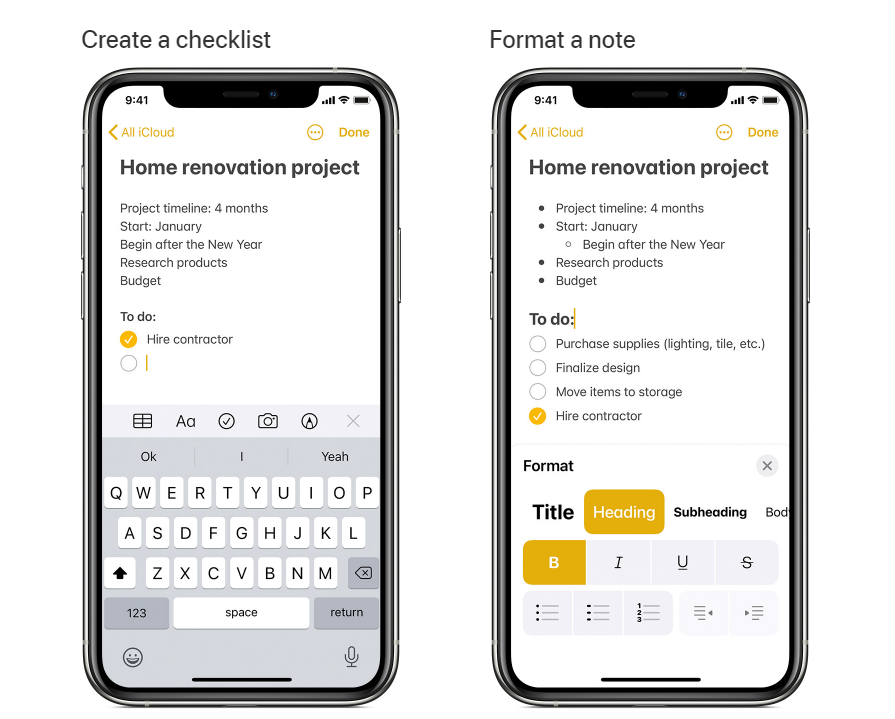
About Apple Notes
With Apple Notes, you can capture your ideas the very moment they come across your mind. If you’re using iPhone, iMac, and iPad, this note taking tool will definitely meet most (if not all) of your note-taking requirements. Quite similar to Simplenote, Apple Notes seamlessly syncs with iCloud.
You can drag and drop content including photos, and also create and manage simple basic to-do lists. With iOS and iPadOS 13, the Notes app adds a variety of new features, including a Gallery View, checklist options, subfolders, shared folders, and more. This tool has always been a fast and convenient way to note random thoughts or pen-down organized lists.
Apple Notes Pros:
- Swift and easy note taking tool
- Ideal for iPad, iPhone, and iMac users
- Similar to Simplenote in terms of functionality
- Gallery view
- Checklist view
Apple Notes Cons:
- No use for Android and Windows users
- Lacks the features of a full-on note taking tool
Pricing: Free
Available For: iOS only
13. Bear

About Bear
Bear is a beautiful, flexible note taking app for crafting notes and prose. Bear feels lightweight and faster. It supports Markdown which enables you to write notes faster. As it is only available on Mac and iOS, you can link notes to each other to build a body of work.
You can add hashtags to organize the way you work, and use face/Touch id to protect sensitive notes. From quick notes to in-depth essays, and advanced mark-up options, Bear can be an online writer’s best friend. Beautiful themes and typography make your writing look great before and after publishing.
Bear Pros:
- Supports Markdown
- Fast search
- Quick, easy setup
- Clean user interface
- Good options for exporting and importing notes
- Inexpensive
Bear Cons:
- A limited set of features
- No integrations with third-party apps like Trello
- For Apple users only
- Syncing requires a paid plan
Pricing: The Paid plan starts at $1.49 monthly. The second paid plan is priced at $14.99 for the year.
Available For: iOS and Mac only
14. Ulysses
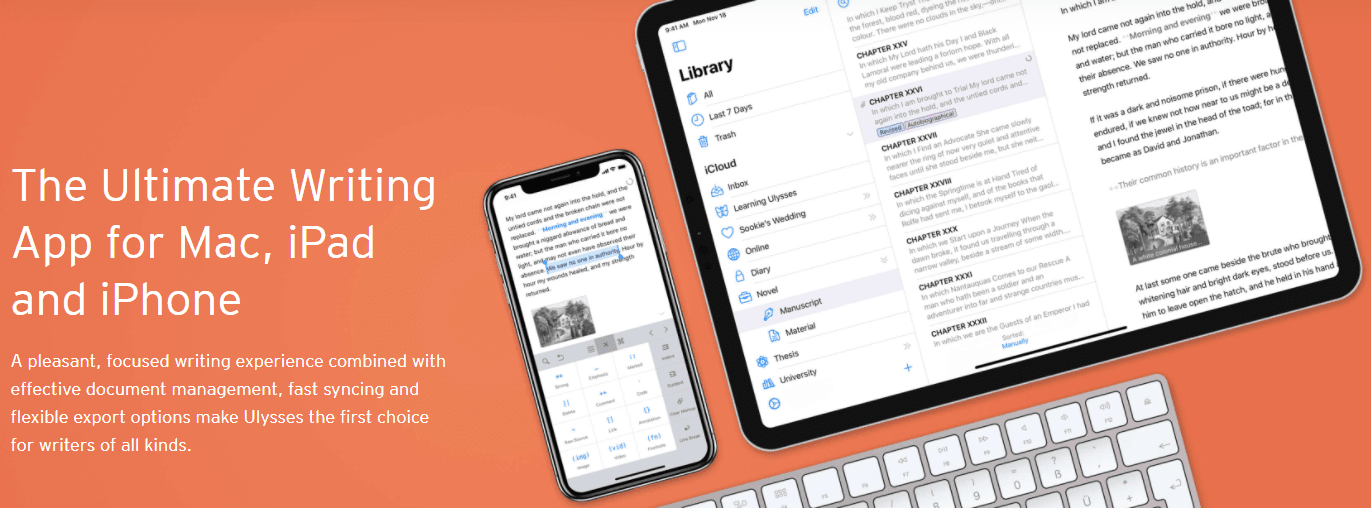
About Ulysses
Ulysses is a powerful note-taking and writing tool that allows you to convert notes into articles, blog posts, or book chapters. Users can use Ulysses to arrange their notes into folders and set writing goals. This note taking tool supports Markdown, contains several themes, and a typewriter mode.
Ulysses encourages immersion with the text and helps to increase productivity. It is a fully-fledged writing tool and can give a good run for money to any distraction-free writing app. You can organize all your projects in Ulysses’ unified library, of all sizes and ambitions. You can even publish to WordPress and Medium right from within the app.
Ulysses Pros:
- Supports many writing styles
- Tags and folders are good for arranging ideas
- Clean and intuitive workspace
- Word-goal allows you to set target word count
- Mark-up based text editor
- Full suite of organizational tools
Ulysses Cons:
- Only for iOS users
- Small learning curve
- Expensive subscription-only pricing
Pricing: The Paid plan starts from $5.99 per user/month
Available For: Mac and iOS
15. Typora
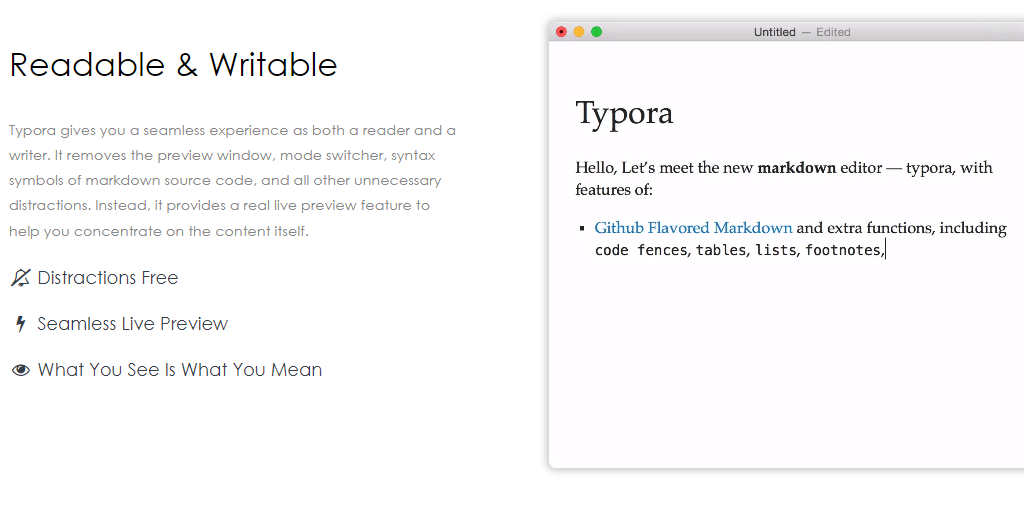
About Typora
Typora is a truly unique tool in this list. This minimalistic note-taking application helps you create organized notes that come out just the way you expect them to. The software platform in question has an active HTML editor that helps you format your text as you write in the most effortless manner possible.
It can help you create a table of contents to keep track of all your headlines, subheadings, titles, and the outline as a whole. Therefore, if you are looking for a tool that helps you create notes that come out in the most detailed and organized way possible, Typora is the way to go.
Typora Pros:
- Focus Mode
- Typewriter mode
- Extremely customizable
- Import and export files in the form of PDF files.
- Predefined themes
- A Markdown editor that formats your text when you write
Typora Cons:
- There is no mobile app available for Android and iOS
- Only available as a desktop version
- Created notes cannot be saved within the app but can be downloaded as documents on the system.
Pricing: Available for free.
Available for: Windows and Linux
16. Roam Research
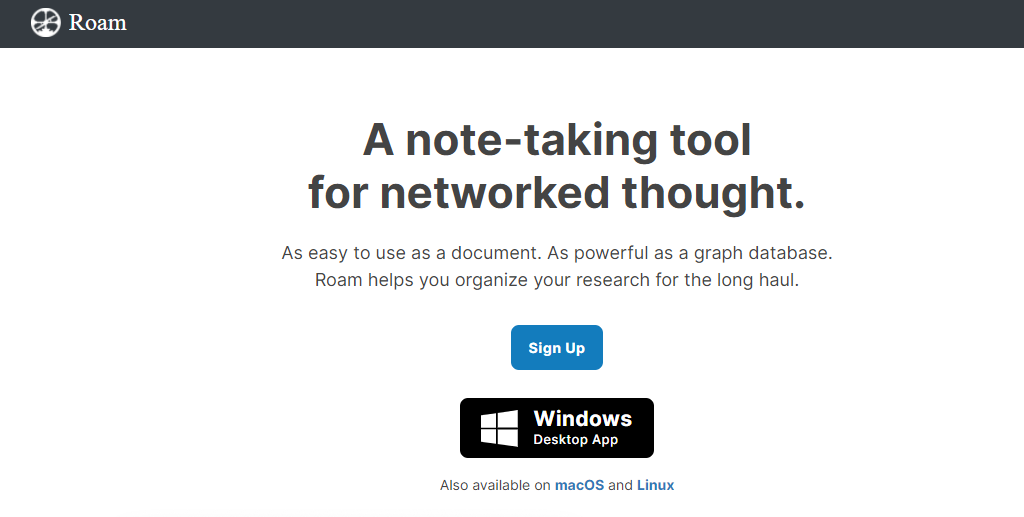
About Roam Research
Roam is a unique note-taking app designed specifically for research and academic use. It helps people save and store information in the form of index cards. this is what makes Roam research different from, say, Evernote, Google Docs, and Notion since it has more of a card approach than a notebook one.
Roam helps jot down important information on the go, and the best part is that this information is, in turn, extensively local and can be found and filtered with a few quick steps. It offers great perks such as real-time multi-user collaboration, developer API, and some amazing third-party integrations.
Roam Research Pros:
- Bullet point widgets
- Third-party widgets
- To-do lists
- Range sliders
- Geofencing, geocoding, and geolocation
- Mobile access
- Successful data mapping
Roam Research Cons:
- Not the best tool for people who want to write long-form articles
- Does not have an easy-to-navigate interface
- Not the most suitable for collaborative teams
- The mobile app is a bit glitchy
Pricing: The Pro plan is available for $13.75/month when paid annually.
The Believer plan is available for $8.33/month when paid annually.
Available for: macOS, Linux, and Windows.
17. Microsoft OneNote
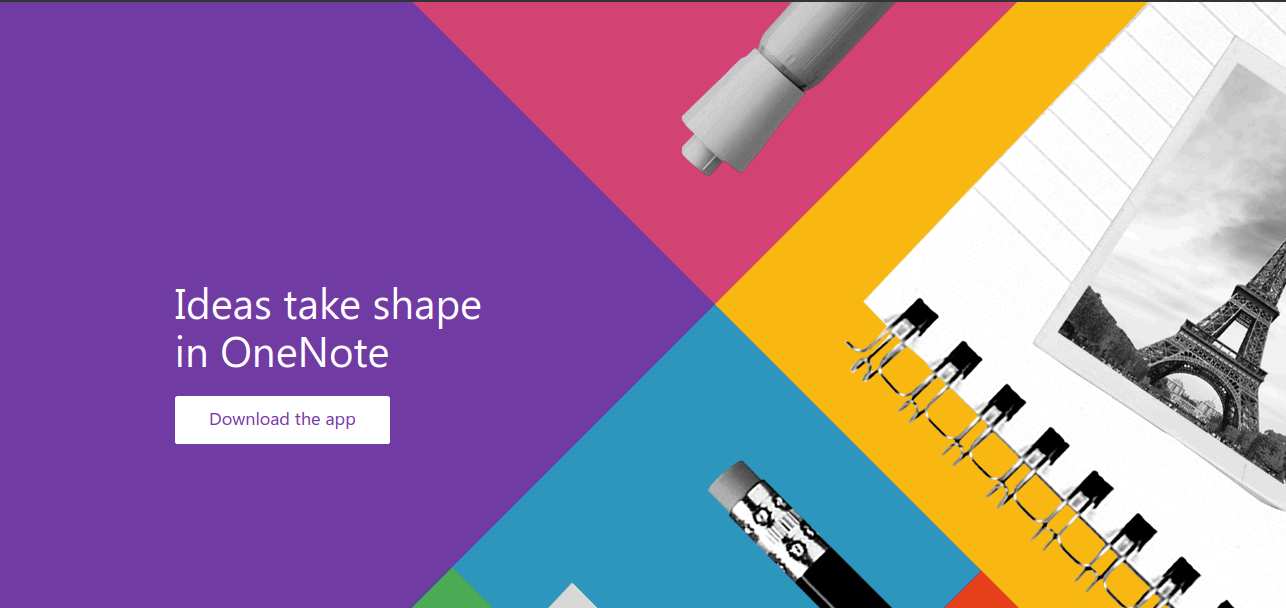
About Microsoft OneNote
Similar to note taking tools like Evernote and Dropbox Paper, OneNote lets you store text and images in free-form documents that you can share with others or keep private. OneNote is a part of the Microsoft Office Suite, along with programs like Word, Excel, and PowerPoint.
Easy navigation and versatile search tools let you find notes right where you left them. OneNote works across all devices, and you can revise your notes with type, highlighting, or ink annotations. Share your bright ideas, collaborate on them, and organize your notes in distinct notebooks that can be divided into sections and pages.
Microsoft OneNote Pros:
- Cloud syncing
- Integration with Outlook
- Versatility
- Simple, thought-out user interface
Microsoft OneNote Cons:
- It doesn’t always sync immediately between the desktop and the cloud versions
- Can have more robust table features
Available For: Windows, iOS, Android
18. Google Keep
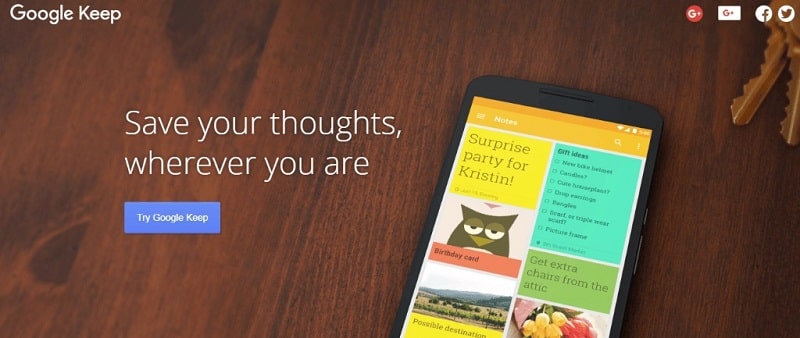
About Google Keep
Google Keep is a free note-taking app for personal use. Capture your notes, lists, photos, and audio to keep and set location-based and/or time-based reminders to make sure you never miss a thing.
Google Keep is fast, colorful, and comes on many Android devices. Google Keep supports image recognition, which enables you to convert images (photos of your notes) and PDFs into searchable text. Keep work on your phone, tablet, and computer. Everything you add to Keep syncs across your devices so your important stuff is always with you.
Google Keep Pros:
- Syncs across all your devices
- Colorful
- Intuitive
- User friendly
Google Keep Cons:
- Less useful for larger note databases
- No tags
- Better suited for users who already use Google/Android services
Available For: Android, Chrome, iOS, Web Version
Hunting for the perfect note-taking app? Go ahead and get started with ProofHub—for FREE!
What makes a great note taking app?
When you’re looking for a powerful note taking app, you probably are looking for a great application that you can depend on. The best note taking apps make the task of jotting down information very simple and easy, wherever you are.
While there are many apps for taking notes, very few of them offer you the right combination of functionality, efficiency, and affordability.
Remember, there cannot be a universally perfect note-taking tool, and no app will do all the work for you. However, there are some essential features that best note taking tools must offer to their users.
You should also consider them while checking them out. Here’s a look at those features first before we move any further:
- Works Across Multiple Devices- Whether you take notes at home, at work, or on the go, on either desktop or mobile, a good note taking app works smoothly across all devices, without any glitches. You can access all the information shared in these notes, (webpage, image, quotes, etc) on multiple devices, even if you saved it on a single device.
- Guarantees Users’ Privacy- Users’ notes can contain personal information that may be sensitive. A great note taking app sync notes with end-to-end encryption, which allows you to use a password that is never sent to the app. While using these you have to be certain that the information stored in them is completely secure.
- Supports Different Types Of Notes- Best note taking tools support different formats other than text, like images, audio, scanned documents, clipped web pages, and checklists.
- Ability To Organize- A great note taking app lets you easily organize different types of notes in folders and subfolders. You can keep them private, attach files, collaborate on them smarter, and store them in notebooks in one place. You can add comments, attach files, and download notes in PDF format.
- Searchable Notes– You can easily find what you’re looking for in notes by using relevant keywords and phrases with advanced search.
- Value For Money- A great note-taking app gives you bang for every buck you spent on it. They also offer a free version to let users get the hang of it. Paid versions are usually packed with a host of features at an affordable price.
Conclusion
Note taking is one of the most common needs of individuals as well as teams. Today, there are dozens if not hundreds of note taking apps available in the market. And the question of the hour is — Which note taking app will you choose? The apps we’ve listed in this post are known as the best note taking apps for a reason. Go through these apps carefully to get a better understanding of which of these tools will work best for you and your teams.
What is note taking app?
Note taking apps are the kind of apps that let you keep everything from a small idea to brief minutes of meeting in one place, on your desired device.
What is the best app for note taking?
The best note-taking app will always emphasize collecting and organizing short-term as well as long-term data in one place. Read this article to know the best options available.
What is better than Evernote?
Evernote is just a standalone note-taking application. Read on to learn about popular all-around management solutions that are highly likely to beat Evernote in terms of functionality and usability.
What are the best note taking apps?
ProofHub is a versatile project management software that helps record meeting minutes and create different notebooks to store ideas. Other great note-taking apps include Apple Notes, Bear, and Evernote.
